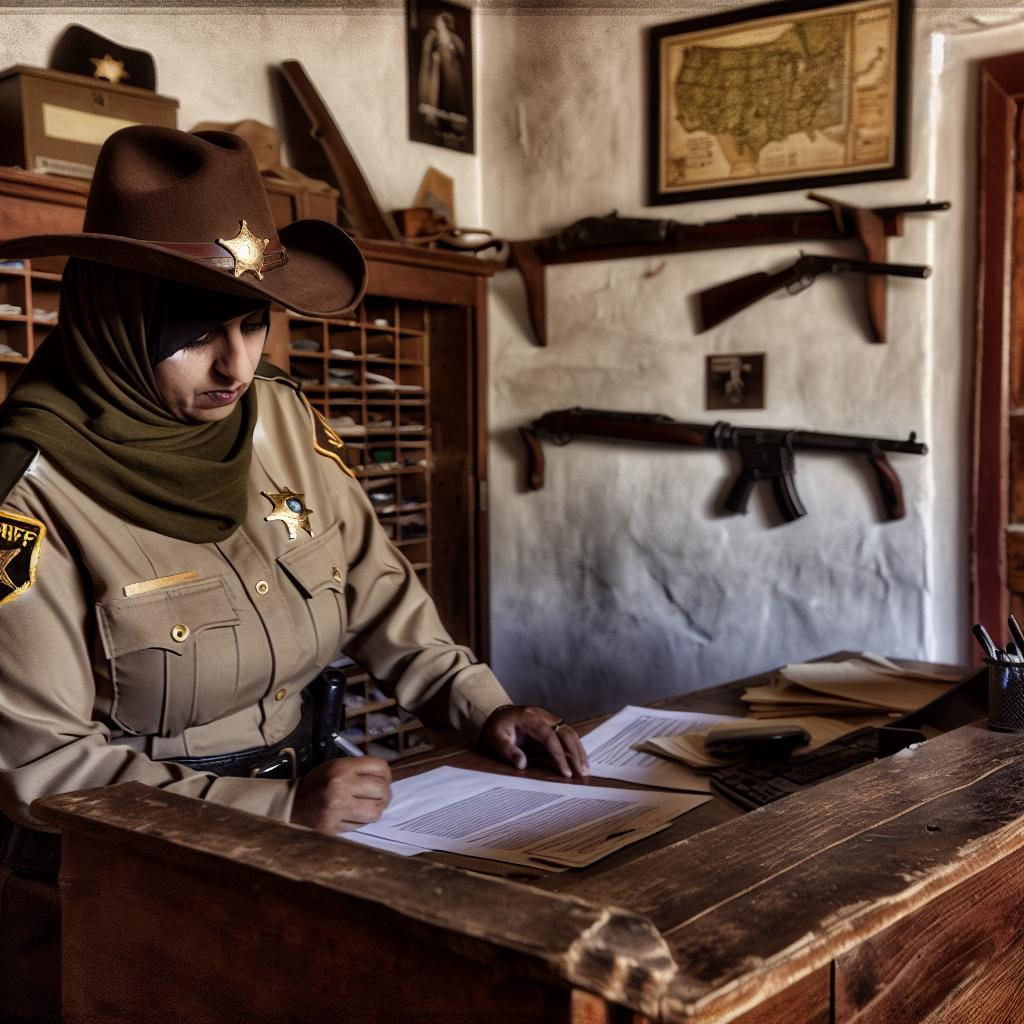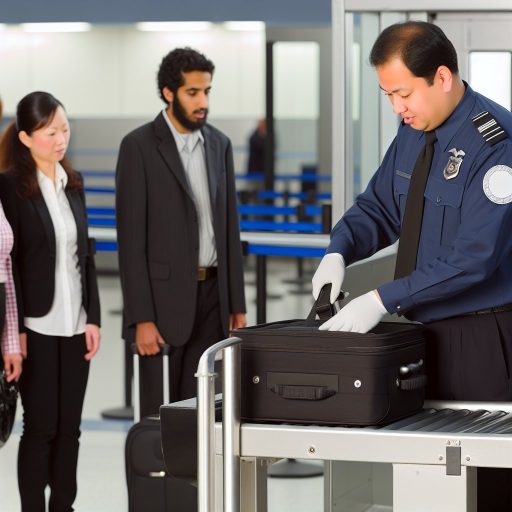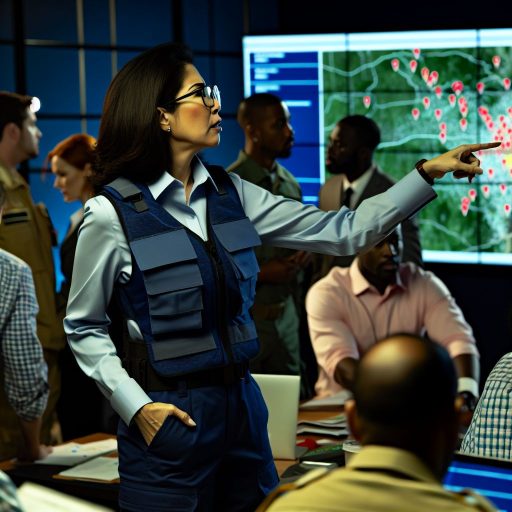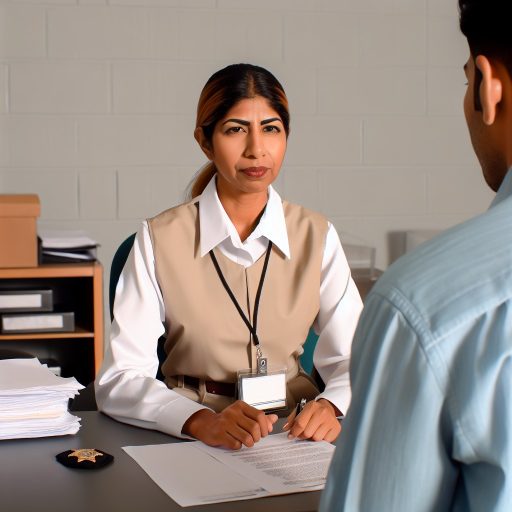Introduction
A sheriff and deputy sheriff are essential members of law enforcement agencies.
They are responsible for maintaining peace and order in a community.
Understanding their daily duties is crucial as they play a significant role in upholding the law and protecting citizens.
From patrolling neighborhoods to investigating crimes, sheriffs and deputy sheriffs are always on the front lines of law enforcement.
Their commitment to serving and protecting the community is unmatched.
This makes them integral parts of the criminal justice system.
As we delve into the daily duties of these law enforcement officers, we will gain a deeper appreciation for the work they do.
They face challenges on a regular basis.
By learning about their responsibilities, we can better understand and support their efforts.
Ultimately, they work to keep our communities safe.
Job Responsibilities of a Sheriff:
Sheriffs play a vital role in maintaining law and order within their respective counties or jurisdictions.
Their job responsibilities are diverse and demanding, requiring a wide range of skills and competencies to effectively carry out their duties.
Enforcing Laws and Regulations:
One of the primary responsibilities of a sheriff is to enforce all laws and regulations within their jurisdiction.
This involves patrolling the area, investigating crimes, and apprehending suspects.
Sheriffs work closely with local law enforcement agencies to ensure public safety and prevent criminal activities.
Managing Department Personnel and Resources:
Sheriffs are responsible for managing the personnel and resources within their departments.
They oversee the recruitment, training, and supervision of deputies and administrative staff.
Sheriffs also allocate budgets, equipment, and other resources to ensure the effective operation of the department.
Serving and Executing Warrants, Subpoenas, and Court Orders:
Another important aspect of a sheriff’s job is serving and executing warrants, subpoenas, and court orders.
This involves delivering legal documents to individuals, businesses, or other entities as required by the court.
Transform Your Career Today
Unlock a personalized career strategy that drives real results. Get tailored advice and a roadmap designed just for you.
Start NowSheriffs must ensure that all legal processes are carried out in a timely and lawful manner.
The job responsibilities of a sheriff are varied and challenging.
From enforcing laws and regulations to managing department personnel and resources, sheriffs play a crucial role in maintaining public safety and upholding the law within their communities.
- Enforcing laws and regulations in a specific county or jurisdiction
- Managing department personnel and resources
- Serving and executing warrants, subpoenas, and court orders
Daily Duties of a Sheriff
As the highest-ranking law enforcement official in a county, the sheriff holds a significant role in ensuring public safety and upholding the law.
Their daily duties are crucial in maintaining order and protecting the community.
Let’s delve into the detailed responsibilities of a sheriff and how they execute their duties effectively.
Patrolling Assigned Areas
One of the primary responsibilities of a sheriff is to patrol assigned areas within the county.
This involves driving through neighborhoods, monitoring traffic, and ensuring public spaces are safe for residents.
By being present in the community, sheriffs can deter criminal activity and provide a sense of security to the public.
Responding to Emergency Calls
Sheriffs are required to respond promptly to emergency calls from residents or dispatchers.
Whether it’s a domestic disturbance, a car accident, or a medical emergency, sheriffs must assess the situation and take appropriate action.
They play a crucial role in handling emergencies and providing assistance to those in need.
Investigating Crimes and Making Arrests
When crimes occur within their jurisdiction, sheriffs are responsible for conducting thorough investigations.
This involves collecting evidence, interviewing witnesses, and gathering information to solve the case.
If necessary, sheriffs have the authority to make arrests and detain suspects until they can be brought to justice.
By upholding the law and holding criminals accountable, sheriffs help maintain order and protect the community from harm.
Gain More Insights: Park Ranger’s Role in Preserving Historic Sites
Collaboration with Other Law Enforcement Agencies:
Sheriffs and Deputy Sheriffs play a crucial role in collaborating with other law enforcement agencies to ensure public safety and security.
Here are some of the ways they work together with different organizations:
Coordinating with Local Police Departments:
Sheriffs and Deputies often work closely with local police departments to provide support and assistance in various law enforcement activities.
Transform Your Career Today
Unlock a personalized career strategy that drives real results. Get tailored advice and a roadmap designed just for you.
Start NowThis collaboration helps in sharing resources, expertise, and manpower to effectively combat crime in the community.
By coordinating efforts with local police agencies, Sheriffs can ensure a coordinated response to emergencies and criminal incidents.
Collaboration with Federal Agencies:
In addition to working with local police departments, Sheriffs and Deputies also collaborate with federal agencies such as the FBI, DEA, and ATF on joint operations.
These partnerships allow for the sharing of specialized resources, intelligence, and information to target organized crime, drug trafficking, and other high-profile criminal activities.
By combining forces with federal agencies, Sheriffs can enhance their investigative capabilities and address complex criminal cases more effectively.
Sharing Information and Intelligence:
One of the key aspects of collaboration among law enforcement agencies is the sharing of information and intelligence.
Sheriffs and Deputies regularly exchange data, reports, and analysis with other agencies to identify criminal trends, suspects, and potential threats to public safety.
This information sharing helps in preventing criminal activities, apprehending suspects, and disrupting criminal networks operating in the community.
By working together and pooling resources, law enforcement agencies can stay ahead of evolving criminal threats and protect the community more effectively.
Explore Further: Emergency Management Director: Community Preparedness Programs
Community Engagement
Community engagement is a vital aspect of the daily duties of a sheriff and deputy sheriff.
By building relationships with community members, law enforcement officers can establish trust, cooperation, and a sense of safety within the community.
Attending public events and meetings is a proactive approach to addressing concerns and gathering feedback from residents.
It allows sheriffs and deputy sheriffs to interact with community members face-to-face, listen to their needs, and provide solutions to any issues that may arise.
By participating in community engagement activities, sheriffs and deputy sheriffs can create a positive impact on the community as a whole.
This engagement helps to build a strong rapport between law enforcement and residents, leading to a safer and more united community.
- Building relationships with community members to foster trust and cooperation.
- Attending public events and meetings to address concerns and gather feedback from residents.
You Might Also Like: Cybersecurity Specialist: Ethical Considerations in the Job
Administrative Tasks:
As a Sheriff or Deputy Sheriff, administrative tasks are an essential part of the job responsibilities.
These tasks involve ensuring that the department runs smoothly and efficiently, and that resources are allocated appropriately.
Reviewing Reports and Paperwork:
One of the crucial administrative tasks for a Sheriff or Deputy Sheriff is reviewing reports and paperwork submitted by deputies.
Transform Your Career Today
Unlock a personalized career strategy that drives real results. Get tailored advice and a roadmap designed just for you.
Start NowThis includes incident reports, arrest reports, and other documentation related to law enforcement activities.
By reviewing these reports, the Sheriff can ensure that proper procedures were followed and that cases are being handled effectively.
Overseeing Budget Allocations:
Another important administrative duty is overseeing budget allocations and financial management for the department.
This involves creating budgets, monitoring expenses, and ensuring that funds are used wisely.
The Sheriff must make strategic decisions about where to allocate resources to ensure that the department can effectively carry out its duties.
Training and Mentoring:
Training and mentoring new recruits and officers is also a key aspect of administrative tasks for a Sheriff or Deputy Sheriff.
This involves developing training programs, providing guidance and support to new officers, and helping them develop the skills they need to succeed in their roles.
Mentoring is essential for fostering a positive work environment and ensuring that all officers are well-prepared to handle their responsibilities.
Administrative tasks are fundamental to the daily duties of a Sheriff and Deputy Sheriff.
By effectively managing resources, reviewing reports, and providing training and mentorship, Sheriffs can lead their departments to success and ensure the safety and well-being of their communities.
Learn More: CBP Officer’s Role in Natural Disaster Response

Specialized Assignments and Training:
Being a sheriff or deputy sheriff requires more than just patrolling the streets and enforcing the law.
These law enforcement officers also participate in specialized assignments and undergo continuous training.
This ensures they are equipped to handle various situations effectively.
Specialized Units:
One of the specialized assignments that sheriffs and deputy sheriffs may be involved in is joining units such as the SWAT team, K-9 unit, or narcotics division.
These units are tasked with handling high-risk situations, conducting drug raids, and ensuring the safety of the community.
SWAT (Special Weapons and Tactics) teams are trained to handle hostage situations, armed confrontations, and other dangerous scenarios.
Members of the SWAT team undergo rigorous training to develop skills in marksmanship, tactical planning, and close-quarters combat.
K-9 units utilize police dogs to assist in various law enforcement activities, including tracking suspects, detecting drugs or explosives, and searching for missing persons.
Deputy sheriffs assigned to K-9 units receive specialized training to work effectively with their canine partners.
Transform Your Career Today
Unlock a personalized career strategy that drives real results. Get tailored advice and a roadmap designed just for you.
Start NowWorking in the narcotics division involves investigating drug-related crimes, conducting undercover operations, and disrupting drug trafficking operations.
Sheriffs and deputy sheriffs assigned to this unit undergo specialized training to recognize drug-related activity and gather evidence for prosecution.
Continuous Training:
Staying updated on new laws, tactics, and technologies is crucial for law enforcement officers to perform their duties effectively.
Sheriffs and deputy sheriffs attend regular training sessions to enhance their skills and stay current with changes in the legal system.
Training sessions cover a wide range of topics, including firearms proficiency, defensive tactics, de-escalation techniques, and communication skills.
Officers also receive training on handling mental health crises, responding to active shooter situations, and conducting investigations.
In addition to regular training sessions, sheriffs and deputy sheriffs obtain certifications in specialized areas such as crisis intervention, forensic analysis, and traffic accident reconstruction.
These certifications demonstrate their proficiency in specific tasks and enhance their credibility as law enforcement professionals.
Professional Development:
Attending conferences, workshops, and seminars is another way for sheriffs and deputy sheriffs to expand their knowledge and skills.
These events provide opportunities to learn about best practices, new technologies, and emerging trends in law enforcement.
Conferences also allow law enforcement officers to network with colleagues from other agencies, share experiences, and exchange ideas on how to address common challenges.
By participating in professional development opportunities, sheriffs and deputy sheriffs can stay motivated, engaged, and informed in their careers.
Specialized assignments and continuous training are essential components of the daily duties of a sheriff and deputy sheriff.
By participating in specialized units and staying updated on new laws and tactics, these law enforcement officers can better protect and serve their communities.
Use of Technology and Equipment:
- Utilizing body cameras, dash cameras, and other tools to gather evidence
- Maintaining weapons, vehicles, and other equipment in good working condition
- Staying current on technological advancements to aid in investigations and operations
Technology has revolutionized law enforcement practices.
Sheriffs and deputy sheriffs are no exception.
These professionals rely on various tools and equipment to perform their duties effectively and efficiently.
Here are some key aspects of how technology and equipment are used in their daily routine:
Utilizing Body Cameras, Dash Cameras, and Other Tools to Gather Evidence
One of the most significant advancements in recent years is the widespread use of body cameras and dash cameras by law enforcement officers.
Sheriffs and deputy sheriffs often wear body cameras while on duty to record interactions with the public.
Transform Your Career Today
Unlock a personalized career strategy that drives real results. Get tailored advice and a roadmap designed just for you.
Start NowThey gather evidence and protect themselves against false accusations.
Dash cameras installed in patrol vehicles capture footage of traffic stops and other incidents.
This provides valuable evidence for investigations and court proceedings.
Maintaining Weapons, Vehicles, and Other Equipment in Good Working Condition
Ensuring that weapons, vehicles, and other essential equipment are in good working condition is crucial for sheriffs and deputy sheriffs.
They must regularly inspect and maintain their firearms, tasers, handcuffs, and other tools.
This ensures they function properly when needed.
Additionally, patrol vehicles must be regularly serviced and equipped with necessary emergency supplies.
This allows officers to respond to various situations effectively.
Staying Current on Technological Advancements to Aid in Investigations and Operations
Law enforcement agencies continuously adopt new technologies.
This enhances their investigative capabilities and operational efficiency.
Sheriffs and deputy sheriffs must stay informed about the latest advancements in surveillance tools, forensic analysis techniques, and communication systems.
They need to stay ahead of criminals and effectively combat crime.
Training programs and workshops are often conducted to familiarize officers with new equipment and techniques.
Daily Duties of a Sheriff and Deputy Sheriff
Handling emergencies, enforcing laws, providing security, and ensuring public safety are primary responsibilities.
Patrolling assigned areas, responding to calls, and investigating crimes are regular tasks for sheriffs.
Supervising deputies, preparing reports, and maintaining records are also crucial duties for sheriffs.
Training new recruits, organizing community programs, and promoting crime prevention initiatives fall under a sheriff’s jurisdiction.
Similarly, deputy sheriffs assist in law enforcement activities, such as traffic control, crowd management, and arrest procedures.
Executing warrants, transporting inmates, and testifying in court are common duties carried out by deputy sheriffs.
Working closely with other law enforcement agencies, supporting investigations, and collaborating with prosecutors are key responsibilities.
Transform Your Career Today
Unlock a personalized career strategy that drives real results. Get tailored advice and a roadmap designed just for you.
Start NowImplications of Supporting Law Enforcement
Reflecting on the demanding and multifaceted nature of the role of a sheriff and deputy sheriff underscores the commitment required.
Emphasizing the importance of supporting and respecting law enforcement officers in their daily duties is essential for a safe and secure community.




